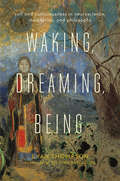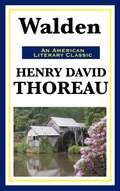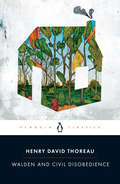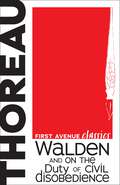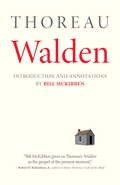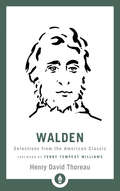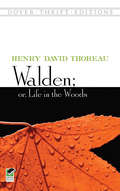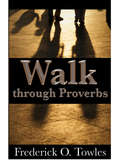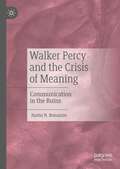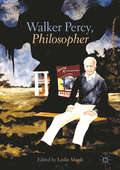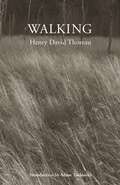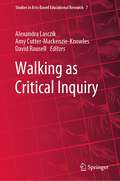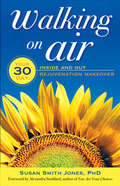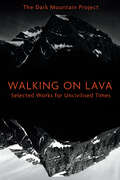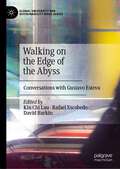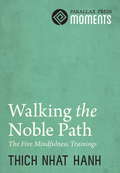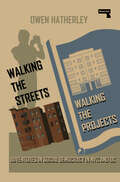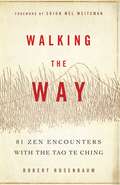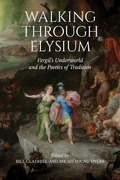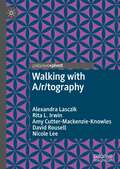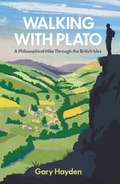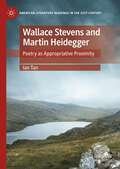- Table View
- List View
Waking, Dreaming, Being: Self and Consciousness in Neuroscience, Meditation, and Philosophy (To The Point)
by Evan ThompsonA renowned philosopher of the mind, also known for his groundbreaking work on Buddhism and cognitive science, Evan Thompson combines the latest neuroscience research on sleep, dreaming, and meditation with Indian and Western philosophy of mind, casting new light on the self and its relation to the brain. Thompson shows how the self is a changing process, not a static thing. When we are awake we identify with our body, but if we let our mind wander or daydream, we project a mentally imagined self into the remembered past or anticipated future. As we fall asleep, the impression of being a bounded self distinct from the world dissolves, but the self reappears in the dream state. If we have a lucid dream, we no longer identify only with the self within the dream. Our sense of self now includes our dreaming self, the "I" as dreamer. Finally, as we meditate—either in the waking state or in a lucid dream—we can observe whatever images or thoughts arise and how we tend to identify with them as "me." We can also experience sheer awareness itself, distinct from the changing contents that make up our image of the self. Contemplative traditions say that we can learn to let go of the self, so that when we die we can witness its dissolution with equanimity. Thompson weaves together neuroscience, philosophy, and personal narrative to depict these transformations, adding uncommon depth to life's profound questions. Contemplative experience comes to illuminate scientific findings, and scientific evidence enriches the vast knowledge acquired by contemplatives.
Walden
by Henry David ThoreauWalden is one of the best-known non-fiction books ever written by an American. It details Thoreau's sojourn in a cabin near Walden Pond, amidst woodland owned by his friend and mentor Ralph Waldo Emerson. Walden was written with expressed seasonal divisions. Thoreau hoped to isolate himself from society in order to gain a more objective understanding of it. Simplicity and self-reliance were Thoreau's other goals, and the whole project was inspired by Transcendentalist philosophy. This book is full of fascinating musings and reflections. As pertinent and relevant today as it was when it was first written.
Walden and Civil Disobedience
by Henry David Thoreau Michael Meyer'If a man does not keep pace with his companions, perhaps it is because he hears a different drummer. Let him step to the music he hears, however measured or far away.' Disdainful of America's growing commercialism and industrialism, Henry David Thoreau left Concord, Massachusetts, in 1845 to live in solitude in the woods by Walden Pond. Walden, the classic account of his stay there, conveys at once a naturalist's wonder at the commonplace and a Transcendentalist's yearning for spiritual truth and self-reliance. But even as Thoreau disentangled himself from worldly matters, his solitary musings were often disturbed by his social conscience. 'Civil Disobedience', expressing his antislavery and antiwar sentiments, has influenced nonviolent resistance movements worldwide. Michael Meyer's introduction points out that Walden is not so much an autobiographical study as a 'shining example' of Transcendental individualism. So, too, 'Civil Disobedience' is less a call to political activism than a statement of Thoreau's insistence on living a life of principle.
Walden, and On the Duty of Civil Disobedience (First Avenue Classics ™)
by Henry David ThoreauIn these two American literary classics, Henry David Thoreau offers readers his experiences and thoughts on how to live a more fulfilling life and stand up for what is right. Having spent two years living in solitude at Walden Pond, he stresses the importance of a quiet, reflective life and the rewards of a nonmaterialistic existence in Walden. His essay "On the Duty of Civil Disobedience" discusses his belief in nonviolent protests against an unjust government—in particular, he attacks the US government's approval of slavery and support for the Mexican-American War. These unabridged versions were first published in 1854 and 1849, respectively, but their ideas are timeless.
Walden: Oder Leben In Der Waldern (Concord Library)
by Henry David ThoreauFirst published in 1854, Henry David Thoreau's groundbreaking book has influenced generations of readers and continues to inspire and inform anyone with an open mind and a love of nature. With Bill McKibben providing a newly revised Introduction and helpful annotations that place Thoreau firmly in his role as cultural and spiritual seer, this beautiful edition of Walden for the new millennium is more accessible and relevant than ever.
Walden: Selections from the American Classic (Shambhala Library)
by Henry David Thoreau Terry Tempest WilliamsSelections from one of the great classics of literature--now part of the Shambhala Pocket Library.In July 1845, Henry David Thoreau built a small cottage in the woods near Walden Pond in Concord, Massachusetts, and began to write Walden, a chronicle of his communion with nature. Since its first publication in 1854, the work has become a classic, beloved for its message of living simply and in harmony with nature. This abridged edition of Walden features exquisite wood engravings by Michael McCurdy and a foreword by noted author and environmentalist Terry Tempest Williams, who reflects upon Thoreau’s message that as we explore our world and ourselves, we draw closer to the truth of our connectedness.This book is part of the Shambhala Pocket Library series.The Shambhala Pocket Library is a collection of short, portable teachings from notable figures across religious traditions and classic texts. The covers in this series are rendered by Colorado artist Robert Spellman. The books in this collection distill the wisdom and heart of the work Shambhala Publications has published over 50 years into a compact format that is collectible, reader-friendly, and applicable to everyday life.
Walden; Or, Life in the Woods
by Henry David ThoreauNature was a form of religion for naturalist, essayist, and early environmentalist Henry David Thoreau (1817–62). In communing with the natural world, he wished to "live deliberately, to front only the essential facts of life, and … learn what it had to teach." Toward that end Thoreau built a cabin in the spring of 1845 on the shores of Walden Pond — on land owned by Ralph Waldo Emerson — outside Concord, Massachusetts. There he observed nature, farmed, built fences, surveyed, and wrote in his journal.One product of his two-year sojourn was this book — a great classic of American letters. Interwoven with accounts of Thoreau's daily life (he received visitors and almost daily walked into Concord) are mediations on human existence, society, government, and other topics, expressed with wisdom and beauty of style.Walden offers abundant evidence of Thoreau's ability to begin with observations on a mundane incident or the minutiae of nature and then develop these observations into profound ruminations on the most fundamental human concerns. Credited with influencing Tolstoy, Gandhi, and other thinkers, the volume remains a masterpiece of philosophical reflection.A selection of the Common Core State Standards Initiative.
Walk Through Proverbs
by Frederick O. TowlesWalk Through Proverbs is a journey through the book of Proverbs containing thought provoking questions, and an invitation to journal through the book of wisdom. For four months, this book will give you daily inspiration and practical application straight from scripture, and to your heart.
Walker Percy and the Crisis of Meaning: Communication in the Ruins
by Justin N. BonannoIn this book, Justin N. Bonanno builds off of the recent philosophical work on Walker Percy’s writings. While it is valuable to appreciate Percy as a novelist, Bonanno approaches Percy from the perspective of Continental philosophy and the rhetorical tradition. Unpacking the works of several key authors that influenced Percy (e.g. Sartre and Heidegger), Bonanno offers a fresh philosophical account of Percy's ideas concerning the relationship between symbols and existence. In particular, he focuses on how Percy’s ideas emerge from the thought of Ernst Cassirer, Susanne Langer, Jacques Maritain, Jean-Paul Sartre, Gabriel Marcel, Martin Heidegger, Viktor Shklovsky, Søren Kierkegaard, and St. Thomas Aquinas.
Walker Percy, Philosopher
by Leslie MarshThough Walker Percy is best known as a novelist, he was first and foremost a philosopher. This collection offers a sustained examination of key aspects to his more technical philosophy (primarily semiotics and the philosophy of language) as well as some of his lesser known philosophical interests, including the philosophy of place and dislocation. Contributors expound upon Percy’s multifaceted philosophy, an invitation to literature and theology scholars as well as to philosophers who may not be familiar with the philosophical underpinnings of his work.
Walking
by Henry David Thoreau Adam Tuchinsky“In wildness is the preservation of the world,” wrote Thoreau in his iconic deathbed essay “Walking.” Celebrates the bicentennial of Thoreau’s birth in 1817. This summation of his life’s work, published posthumously in 1862, became a seminal influence in the modern environmental movement and is no less relevant today than 150 years ago. “Above all, we cannot afford not to live in the present,” he wrote. He extolled walking as a delightful and necessary idleness, an antidote to the burdens of civilization, a means of immersing ourselves in nature and awakening to the moment. “Walking” is recognized by most scholars as Thoreau’s “other” masterpiece, Walden in a more concise form. In the introduction of this edition, Adam Tuchinsky accessibly and engagingly unpacks the essay’s nineteenth-century associations, highlights the startling modernity of its sentiments, and reveals why Thoreau remains the towering figure in the history of American nature writing. Exquisite contemporary nature photographs curated by Denise Froehlich grace this handsome book. antique-looking paper B&W nature photos from Kurito Koichiro and other fine art photographers captioned with memorable lines from Thoreau’s writings.
Walking
by Henry David ThoreauThis summation of his life's work, published posthumously in 1862, became a seminal influence in the modern environmental movement and is no less relevant today than 150 years ago. &“Above all, we cannot afford not to live in the present,&” he wrote. He extolled walking as a delightful and necessary idleness, an antidote to the burdens of civilization, a means of immersing ourselves in nature and awakening to the moment. &“Walking&” is recognized by most scholars as Thoreau's &“other&” masterpiece, Walden in a more concise form. In the introduction of this edition, Adam Tuchinsky accessibly and engagingly unpacks the essay's nineteenth-century associations, highlights the startling modernity of its sentiments, and reveals why Thoreau remains the towering figure in the history of American nature writing. Exquisite contemporary nature photographs curated by Denise Froehlich grace this handsome book.antique-looking paperB&W nature photos from Kurito Koichiro and other fine art photographers captioned with memorable lines from Thoreau's writings.
Walking Wisely
by Charles F. StanleyDR. . CHARLES STANLEY cuts through the" "MYSTIQUE OF WISDOM AND PRESENTS GOD's SIMPLE" PLAN TO BLESS THOSE WHO WALK IN HIS WAYS.
Walking as Critical Inquiry (Studies in Arts-Based Educational Research #7)
by Amy Cutter-Mackenzie-Knowles Alexandra Lasczik David RousellThis book is a transdisciplinary, international collection situated within a genealogy of experimental walking practices in the arts, arts-based research, and emergent walking practices in education. It brings together emerging cartographies of relation amongst walking practices ranging across arts-based, ecological, activist, decolonising, queer, critical and posthuman modes of inquiry. Its particular investment is in the proliferation of artful modes of inquiry that open up speculative practices and concepts of walking as an orientation for pedagogy, inquiry, and the everyday, resisting the gaze of privilege and the relentless commodification of human and nonhuman life processes. This is important work for the burgeoning demand for creative methodologies in the social sciences, and more specifically, for arts-based educational research.
Walking on Air: Your 30-Day Inside and Out Rejuvenation Makeover
by Susan Smith JonesFor readers looking to lose weight, get healthy, or simply break free from a "spin-cycle" lifestyle, this book is exactly the catalyst they need to make the change. Holistic life coach, popular motivational speaker, and frequent guest on George Noory's nationally syndicated "Coast to Coast," Susan Smith Jones offers 30 days of changes that will jumpstart vibrant physical health and get readers feeling more satisfied and spiritually whole. In this complete updating of her 1980s bestseller Choose to Live Peacefully, Smith Jones shares the simple lessons she has used to help thousands of clients make remarkable transformations in their health and happiness. Each chapter offers specific recommendations such as:choosing colorful, rejuvenating, whole foods simplifying one's surroundingspracticing surrendersticking with whatever works to get exercise every dayhonoring intuitionopening oneself up to abundancemastering the art of self-discipline,/P>Smith Jones serves as both astute coach and caring friend as she walks readers through 30 days of changes, to show them how to live a happier and more balanced life, day by opportunity-filled day.
Walking on Lava: Selected Works for Uncivilised Times
by The Dark Mountain ProjectThe Dark Mountain Project began with a manifesto published in 2009 by two English writers—Dougald Hine and Paul Kingsnorth—who felt that literature was not responding honestly to the crises of our time.In a world in which the climate is being altered by human activities; in which global ecosystems are being destroyed by the advance of industrial civilisation; and in which the dominant economic and cultural assumptions of the West are visibly crumbling, Dark Mountain asked: where are the writers and the artists? Why are the mainstream cultural forms of our society still behaving as if this were the twentieth century—or even the nineteenth?Dark Mountain&’s call for writers, thinkers and artists willing to face the depth of the mess we are in has made it a gathering point for a growing international network. Rooted in place, time and nature, their work finds a home in the pages of the Dark Mountain books, with two new volumes published every year.Walking on Lava brings together the best of the first ten volumes, along with the original manifesto. This collection of essays, fiction, poetry, interviews and artwork introduces The Dark Mountain Project&’s groundbreaking work to a wider audience in search of &‘the hope beyond hope, the paths which lead to the unknown world ahead of us.&’
Walking on the Edge of the Abyss: Conversations with Gustavo Esteva (Global University for Sustainability Book Series)
by Kin Chi Lau David Barkin Rafael EscobedoThe book is a collection of essays written by Gustavo Esteva over the last 20 years. In this book, Gustavo Esteva, renowned in Mexico as a philosopher on education and on developmentalism, collects four major areas of his writings: on learning, development, autonomy, and interculturality. A memorial to a great thinker, this book stimulates thoughts on developmentalism across the global south.
Walking the Noble Path
by Thich Nhat HanhZen Master Thich Nhat Hanh presents the true path to a personal and global ethic in this stand alone chapter of Good Citizens: Creating Enlightened Society.
Walking the Streets/Walking the Projects: Adventures in Social Democracy in NYC and DC
by Owen HatherleyA walk through the remnants of a social democratic America, and an argument about its future.In the 1960s, a novel ideology about cities, and what was best for them, emerged in New York. Pushing against the state planning of the time, it held that cities were at their best when they were driven from the bottom-up and when organic, unplanned processes were allowed to run their course, in a spontaneous "ballet of the street". Cities were at their worst, however, when the state stepped in, demolishing lively old neighbourhoods and erecting giant, sterile, empty "projects". This book uses the method of this ideology — walking — to test how true it actually is about the "capital of the twentieth century", New York City, with a brief interlude in the capital, Washington DC.The "projects" that are walked in this book range from cultural complexes in Manhattan to New Deal-era public housing developments in Brooklyn, Harlem and Queens, from the social experiment of Roosevelt Island to Communist housing co-operatives in the Bronx, from the union-driven rebuilding of the Lower East Side to DC's magnificent Metro. For all their many flaws, they prove that Americans could, in fact, plan and build fragments of a better society, which survive and sometimes thrive today in one of the unequal places on earth. Walking the Streets/Walking the Projects takes a hard look at these enclaves, and asks what a new generation of American socialists might be able to learn from them.
Walking the Way
by Robert Rosenbaum Sojun Mel WeitsmanWalking the Way affirms that, like yin and yang, the flowing spontaneity of Tao and the precise simplicity of Zen find perfect balance with one another. Robert Meikyo Rosenbaum brings the two traditions together in a unique presentation that elicits Zen insights from his fresh interpretation of verses from the Taoist classic, the Tao Te Ching. Personal anecdotes illustrate the dynamic potential of Rosenbaum's approach, skillfully revealing Zen within the Tao and the Tao of Zen. Not only does the author reveal the elegance of each tradition, he shows how their interrelatedness does, in fact, have import on our meditative practices and on our day-to-day lives. Parenting, meditating, dealing with setbacks and illnesses--Walking the Way shows us how to live well in the midst of many complex demands, finding harmony and equilibrium between honing in and letting go, balance between being ourselves and selflessly serving others.
Walking through Elysium: Vergil’s Underworld and the Poetics of Tradition (Phoenix Supplementary Volumes)
Walking through Elysium stresses the subtle and intricate ways writers across time and space wove Vergil’s underworld in Aeneid 6 into their works. These allusions operate on many levels, from the literary and political to the religious and spiritual. Aeneid 6 reshaped prior philosophical, religious, and poetic traditions of underworld descents, while offering a universalizing account of the spiritual that could accommodate prior as well as emerging religious and philosophical systems. Vergil’s underworld became an archetype, a model flexible enough to be employed across genres, and periods, and among differing cultural and religious contexts. The essays in this volume speak to Vergil’s incorporation of and influence on literary representations of underworlds, souls, afterlives, prophecies, journeys, and spaces, from sacred and profane to wild and civilized, tracing the impact of Vergil’s underworld on authors such as Ovid, Seneca, Statius, Augustine, and Shelley, from Pagan and Christian traditions through Romantic and Spiritualist readings. Walking through Elysium asserts the deep and lasting influence of Vergil’s underworld from the moment of its publication to the present day.
Walking with A/r/tography (Palgrave Studies in Movement across Education, the Arts and the Social Sciences)
by Rita L. Irwin Alexandra Lasczik Amy Cutter-Mackenzie-Knowles David Rousell Nicole LeeThis book focuses on critical walking and mapping practices through the research methodology of a/r/tography. Initially establishing seven global sites for employing movement-based research practices within culturally conceived a/r/tographic perspectives, the book builds upon and extends an international community of practice. The editors and contributors apply public pedagogy through a/r/tographic and critical walking inquiry, and explore how these forms may be engaged, understood and expanded globally. The chapters examine how a/r/tography and walking inquiry can be practiced, theorised, experienced, extended and conceptualised. The cartographic perspectives, theoretical positions and conceptual investigations included in this collection respond to the fundamental contemporary need for new and fresh models of teaching, learning and scholarship regarding global and local educational and social challenges. They offer tangible, aesthetic and rigorous examples for researchers, educators, community practitioners and research students to engage with a/r/tography and critical walking inquiry.
Walking with Plato: A Philosophical Hike Through the British Isles
by Gary HaydenAll truly great thoughts are conceived while walking.' So said Friedrich Nietzsche, and so thought philosophy buff Gary Hayden as he set off on Britain's most challenging trek: to walk from John o'Groats to Land's End.But it wasn't all quaint country lanes, picture-postcard villages and cosy bed and breakfasts. Disillusioned after another gruelling day, his feet blistered and his back aching from lugging camping gear, he sought solace in the words of Plato: 'Everything that deceives may be said to enchant.'In this humorous, uplifting and delightfully British tale, Gary finds solitude and weary limbs bring him closer to the wisdom of the world's greatest thinkers. Recalling Rousseau's reverie, Bertrand Russell's misery, Epicurus' joy in simplicity and Thoreau's love of the wilderness, Walking with Plato offers a breath of fresh, country air for anyone craving an escape from the humdrum of everyday life.
Wallace Stevens and Martin Heidegger: Poetry as Appropriative Proximity (American Literature Readings in the 21st Century)
by Ian TanThis book is a unique contribution to scholarship of the poetics of Wallace Stevens, offering an analysis of the entire oeuvre of Stevens’s poetry using the philosophical framework of Martin Heidegger. Marking the first book-length engagement with a philosophical reading of Stevens, it uses Heidegger’s theories as a framework through which Stevens’s poetry can be read and shows how philosophy and literature can enter into a productive dialogue. It also makes a case for a Heideggerian reading of poetry, exploring his later philosophy with respect to his writing on art, language, and poetry. Taking Stevens’s repeated emphasis on the terms “being”, “consciousness”, “reality” and “truth” as its starting point, the book provides a new reading of Stevens with a philosopher who aligns poetic insight with a reconceptualization of the metaphysical significance of these concepts. It pursues the link between philosophy, American poetry as reflected through Stevens, and modernist poetics, looking from Stevens’s modernist techniques to broader European philosophical movements of the twentieth century.
